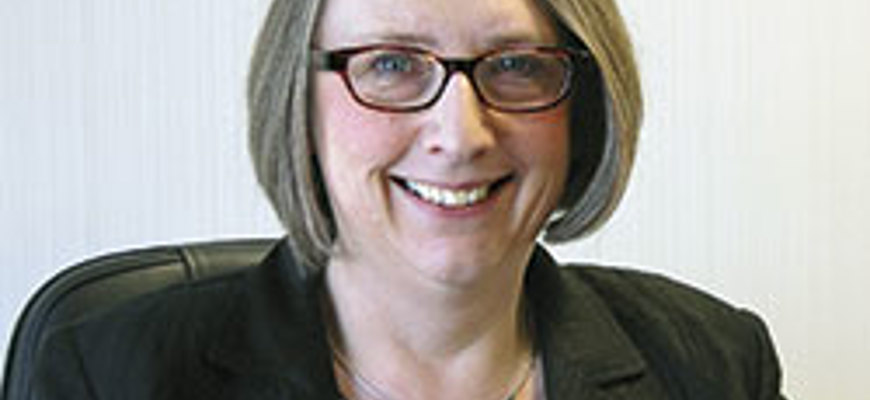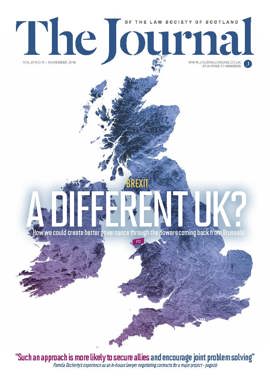Is there a lawyer in the house?

Where do you come from and what was your career path to your current position?
I was born in Dalwhinnie School House and brought up in Inverness. My mother was a midwife, and while I was a student I had a summer job in the maternity unit of Raigmore Hospital, a great experience and, in retrospect, good preparation for working as a lawyer in the NHS! I came to Edinburgh University and never left the city. At Honours I studied medical jurisprudence with Sandy McCall-Smith, now the famous author. I trained in private practice with WJ Burness. When I qualified, a job came up at the Central Legal Office (CLO) of NHS Scotland and I’ve been here now for 32 years. I hadn’t really heard of CLO, but often you stumble into things in life. In 1984 CLO had just eight solicitors; now there are 64! I got the Director role in 2013 after being interim head for a while. It was slightly terrifying at first but the management team are great and I’m really well supported. It’s very enjoyable now.
How would you explain the essence of your role? What would happen to the organisation without a legal team?
My role is to lead the CLO’s work providing a legal service to the NHS and beyond. I’m a litigation lawyer by trade and still do some casework. It’s a management role but also a legal one. CLO is part of National Services Scotland (NSS) and I am also a member of the NSS executive management team.
CLO provides a shared legal service to all the health and special health boards. Since 2014 we are also permitted to provide a legal service to the wider public sector, an interesting development for us. One of our strengths is that as part of the public sector we understand its ethos and challenges. The CLO has built up a huge amount of expertise over the years, for example on clinical negligence and ethical issues. We can be asked to advise on complex issues such as end-of-life decisions or consent to treatment. The NHS is one of the UK’s biggest employers, so it’s invaluable to have its own, experienced employment legal team. It’s also one of the biggest employers of in-house solicitors in Scotland.
I think the centralised model works very well and I often think that if they didn’t have us they’d have to invent us. Our internal clients say that the corporate memory in the CLO is very helpful in the constantly changing environment in which they work.
What is the size of your legal team and how is it structured?
There are 64 solicitors including me, all based in Edinburgh. The structure is:
Litigation department: 31 solicitors covering clinical negligence, employee accidents, fatal accident inquiries, mental health tribunals, GP services, consent to treatment, and more.
Commercial property department: 17 solicitors and one paralegal providing a comprehensive commercial property service.
Employment team: six solicitors who provide a comprehensive employment law service, both contentious and advisory, in the main doing their own advocacy although they instruct counsel from time to time.
Commercial contracts team: all the usual range of commercial contracts practice, including procurement of national IT contracts and advising on intellectual property, along with data protection and freedom of information. Some larger contracts, for example to build a new hospital, are outsourced.
Debt recovery team: made up of paralegals, including an ex-sheriff officer, it recovers the various day-to-day debts of the NHS.
There is no central government funding for the CLO’s work – we have to recover our costs and we charge out our time to our internal clients, e.g. the individual health boards. Each solicitor has a target for fee charging. This has been running since 1995 but may be unusual in the in-house sector. The aim is simply to break even at the end of the year, not to make a “profit”. It’s a very good way of demonstrating the value of the in-house team and makes us very focused on giving the best service we can.
What is a typical working day? What motivates you on a Monday morning?
There is no such thing as a typical day. I spend some time travelling around Scotland speaking to our clients, as well as managing the service within CLO. I still do casework: it’s really important to keep my hand in. I also spend a lot of time providing training to doctors and nurses on medical negligence and the law.
I don’t need to be motivated on a Monday morning – I just love my job. Our clients are great to work with. The CLO is an excellent team, just a great place to work. It’s not a competitive environment: we work together and support each other. I hope there is no blame culture either: if something goes wrong we simply try to sort it out.
What are the pros and cons of being an in-house lawyer, and how do you manage these?
It’s kind of a hybrid role as we do a lot of legal work ourselves; we’re not really outsourcing. The financial rewards will, I can safely surmise, be less than being a partner in a big firm, but the pay is reasonably good. The benefits include a good work-life balance, flexitime and a supportive environment. Each solicitor has a decent case load, plenty of responsibility and interesting work even at more junior level. Some have been able to experience cases in the Supreme Court and can follow the case through from start to finish. We have a good relationship with our own clients; we provide a good service. Every year we do a customer satisfaction survey and we got 97% this year (96% last year), which I’m delighted about.
What are the current hot legal topics, changes and challenges in your sector?
Obviously Brexit could have a major impact on employment law and procurement law, and therefore the NHS. But it is very hard to predict. Then there is the whole question of pre-action protocols in clinical negligence. We started implementing a voluntary one in September this year and a compulsory one is likely to follow. The challenge is getting things done to timescales. But I think it’s important and a really good development. “Justice delayed is justice denied,” as the saying goes.
The 2019 deadline for getting all publicly owned land onto the Land Register is also a big deal for the NHS, which involves our commercial property teams.
More broadly there are the public sector financial pressures and the constant challenges of NHS reorganisation. We have an important role in supporting colleagues through these changes.
What does great service from external solicitors and counsel look like to you?
When I instruct counsel I am looking for them to be approachable, able to understand the ethos of the NHS and the different rules that apply to it (such as the ethical constraints), build up expertise in the area (for example on withdrawal of consent), and be cost effective.
With external solicitors, for example for larger contracts or immigration issues or local sheriff court work, I want them to add value, communicate well, be cost-effective and be recognised experts. We have some excellent external solicitors.
What makes a good in-house lawyer? Does your team offer work experience, summer placements and traineeships?
The ideal in-house solicitor is willing to be part of the team, really understands clients’ needs and pressures and is able to provide a responsive service and take clients’ requirements seriously. I believe integrity is a crucial component of being a good lawyer, and maintaining your reputation is key, as trust is hugely important – a quick “win” over another solicitor is at best a short-term success.
We offer 12 summer placements a year of one week’s duration: a very highly rated programme. This is advertised on our website each February. We prefer people doing law degrees or who are at school and thinking of doing law; for them, it’s first come, first served. We also take on two trainees a year. This has been very successful. We’re about to start recruiting for 2017 and 2018 (we do two years’ recruitment at once, due to the time involved). There’s been a huge benefit to CLO in having younger people coming in, bringing their energy and enthusiasm. There’s no guarantee of a job after the traineeship but it’s always good experience.
What kind of ethical issues do you face in your role?
Ethical issues come up a lot, for example advising on turning off a ventilator in a neonatal unit and consent issues, or Jehovah’s witnesses and blood transfusions. This makes the job interesting. New things come up all the time like the Bribery Act and procurement or human rights issues. We try to support each other through these tough cases, so no one bears the burden alone.
How would you like the In-house Lawyers Committee or the Society to help you and your team?
We’re not as involved with the committee and the Law Society of Scotland as we maybe should be, but I promise to change that. A very good way would be for someone from CLO to join the committee when the next vacancies are advertised. Some of the team are on other Society committees such as Medical Negligence, and sit on the accreditation panel for medical negligence. We also use the service of the Professional Practice team from time to time. We’d love you to visit us to discuss this further. I also think a networking event for in-house trainees across Scotland would be a really good idea.
What is your most unusual or amusing work experience?
I was doing a talk on informed consent to 150 people including senior NHS Staff. I gave my floppy disk of slides to the IT person at the start. I stood up to present and realised that the slide on the huge screen behind me said “Roderick Shippin – Death of a Salesman.” I’d picked up my son’s English homework by mistake. Oops. I just had to switch off the screen and carry on regardless.
What keeps you busy outside of the office?
I think work-life balance is crucial. I do lots outside work such as playing the cello and guitar for my church music group, and lots of entertaining at home.
In this issue
- Insider lists: the new must-do
- Pensions valuation and the “relevant date”
- Data: blurring the lines between privacy and risk?
- IT: the proficiency and the gaps
- Reading for pleasure
- Opinion: Peter Boyd
- Book reviews
- Profile
- President's column
- The Keeper steps in
- People on the move
- Beyond Yes and No: Britain after Brexit
- Brexit: leaving European judicial space
- Timed out? Alternative financial claims by cohabitants
- The end of the cash ISA?
- We need to talk about Beatrice
- Global players
- Digital: the dark side
- Cautionary tale
- Married to the land? – appealed
- Pregnancy: the unequal burden
- Privacy: strictures and safeguards
- Trapped employers – relief any time soon?
- Scottish Solicitors' Discipline Tribunal
- Convenient, but necessary?
- Is there a lawyer in the house?
- From the Brussels Office
- Law reform roundup
- Master Policy: the new team moves in
- The "buzz" of mediation
- Plan into action
- Sorry: the hardest word, made easier
- Ask Ash
- Appraising: what's your score?
- Paralegal pointers






